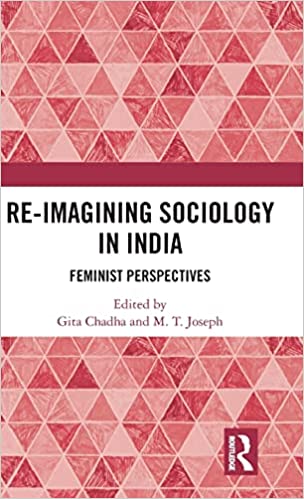
In the honor of feminist sociologist Kamala Ganesh, the book Re-imagining Sociology in India: Feminist Perspectives edited by Gita Chadha and M. T. Joseph and published by Routledge in 2020 attempts to map the unfolding of feminist sociologies in India over the last many decades. The book is divided into three parts. The first section titled Reading and Writing early women in sociology, the foundational section of the book, focuses on the early women sociologists, their lives, and their work. Even though their work may or may not have gendered or feminist connotations, their contribution “embodies a quest – not merely linear transmission, but a notion of shared experiences and collective resistance to patriarchy”.
The first chapter authored by Kamala Ganesh, therefore, is an attempt to acquaint the present and forthcoming generations of sociologists with their histories, challenges, social, political, colonial and gendered situatedness and the importance they hold within sociological and feminist discourses, especially in India, whether their work (directly) deal with feminist ideas or not.
The second section, Pedagogies and Mentoring: Living Process, dives into often neglected spaces of sociological interactions – the sociology classrooms. Finding Feminism(s): Through life in General and Academics in particular by Ashika Bhargav and Rhea D’Silva recounts their journey through sociology, feminism, and gender. It wouldn’t be wrong to believe that the narratives of their lived experiences resonate with a great number of young people, including myself in women and gender studies classrooms. These classroom spaces can also be labelled as transformative, in a way, that it compels its students to become self-reflective and aware of the subjective intersectional situatedness – urging them to unlearn and re-learn the way they have always come to perceive themselves and those around them.
Bhargav’s and D’Silva’s autobiographical pieces also brush upon the gendered and academic hierarchy of disciplines while stressing how feminist pedagogies are expanding and challenging the scope of sociology as a discipline. Thus, challenging the ‘male streaming’ of the disciplines and encouraging a more gender-conscious curation of academic disciplines.
The last section of the book can better be described as a theoretical illustration of the first two sections of the book. While sections one and two attempts at building a more nuanced view of how feminist ideologies are challenging and reshaping the sociological spectrum in India, the last section does just that, by touching upon extremely complex issues of consent, desire, mental health, etc. This section initiates a conversation on subjects and themes, which conventionally were not addressed by the existing sociological pedagogies and shows how the discursive understanding of gender and feminist discourses are addressing these gaps and beyond.
For example Rukmini Sen in Interrogating (Non) Consent in Sexual Intimacies and Infringements: Mapping the socio-legal landscape in India talks about a very delicate yet imperative theme of consent and desire and the role of feminist interventions in this area. In her concluding remarks, she posits a question considering the conventionally assumed passive sexual agency of women and how it shapes the course of legal judgments, “How do sociologists and, more importantly, sociological feminism initiate the shift in conceptual discourse from consent to desire in any sexually intimate relationship?” She admits that even though introducing a feminist legal perspective could disrupt the already existing heterosexual kinship understanding, it could help “facilitate women’s sexual agency even while addressing sexual coercion”.
Pushpesh Kumar’s Desire Violence and ‘PINK MONEY: Life of kothis in a small city of western India is another chapter which discusses the lives of kothis (who unlike Hijras cross-dress only occasionally (in secret, in front of other kothis, anonymous people, or their suitors/panthis) and otherwise don their masculine identity on front of the society. While the central theme of this chapter discusses the lives of kothis, the themes the author is attempting to bring our attention to in the backdrop are equally imperative. They challenge how even the feminist pedagogies, which are constantly challenging the institutions of gender conformities fail to be inclusive towards the communities which are non-conformist because of their gender identity and sexual orientation. This is because their focus often is limited to the “rescue and rehabilitation” of women. Another significant thing which stood out in this chapter was the transparency with which Kumar states and is mindful of his own position as an outsider.
This book, in a nutshell, is an outstanding collection of wonderful essays attempting to bring forward the role of feminist and gender pedagogies in shaping the landscape of sociological studies in India. The book puts forth the legacy of veteran sociologists who paves way for the contemporary and coming generations of feminist sociologists to persist in redefining the discipline.
***
Mansi Malhotra is a post-graduate in Gender Studies from Ambedkar University, New Delhi. She is interested in research areas riveting around gender and violence.
.